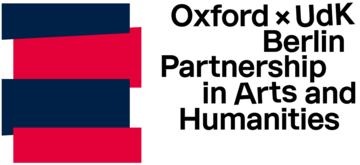New Projects from Oxford/UdK Berlin Seed Fund for Creative Collaborations

The University of Oxford and the Berlin University of the Arts invited researchers, artists and designers to participate in the Oxford–UdK Berlin Partnership in Arts and Humanities. The partnership is an effort to strengthen the ties both between the two institutions and between artistic and academic disciplines, and recently offered seed funding to facilitate interdisciplinary research projects.
We're pleased to announce the awarded projects below, which range from finding visual forms of communicating about vaccines, to examining the role of bread, from subsistence and sustenance to its cultural values.
Berlin-Oxford Liedfest
A project led by Axel Bauni and Caitlin Hulcup at UdK Berlin and Stefano Evangelista and Philip Bullock at Oxford draws musical inspiration from the history and cultural identity of Berlin, focusing on two key moments in the city’s evolving cultural history: the Weimar Republic and the Jewish Enlightenment. It explores the relationship between urban space, creativity, national identity, and cosmopolitanism, and pays particular attention to questions of gender and sexuality. Building on work surrounding the historical experience of British Writers in Berlin, an exhibition of five song recitals and two Song Connection films will be presented at the Berlin-Oxford LiedFest between 19 and 21 November 2021.
Communicating Vaccination
Joining forces to bridge the fields of graphic design, medical history, and health communication, Constanze Hein, graphic design lecturer at UdK Berlin, and Sally Frampton, medical historian at Oxford, will set out to find visual forms of communicating about vaccines. Their project will inspire a new course for Visual Communications students at UdK. The project aims to generate new interdisciplinary research and resources, including a student led website, printed material, and academic outputs. It will engage with an audience of students, educators and the general public to create a discussion around vaccination and communication.
Sound of Contagion
Chelsea Haith (Oxford) and Wenzel Mehnert (UdK Berlin) will continue a project begun during 2020 on the Sound of Contagion. It comprises forms of music, a short story, podcast episodes and algorithm outputs in response to the Covid pandemic. The project will take the existing collaboration further with a series of workshops for graduate students in Berlin, exploring, with the use of AI (artificial intelligence), questions of authorship, applied humanities and the possibilities and limitations of interdisciplinary methodologies.
Boundary Project
The Boundary Project, led by Cécile Girardin (Oxford Martin School), Timothée Ingen-Housz (UdK Berlin), Anna Gleizer (OUCE), and Katja Lehmann (Centre for Ecology and Hydrology), will organize epistemic dialogues between the Arts, the Sciences and the Humanities. Building a constructive, collaborative, and inter-disciplinary platform, this group will bring together an international network of educators and researchers to explore novel ways of teaching and learning resilient, sustainable and just living "within planetary boundaries".
Designing for Anti-Racist Art Schools
Samson Kambalu (Oxford) and Kathrin Peters (UdK Berlin) will embark on a collaboration to re-design the Oxford Ruskin School of Art’s website-infrastructure to reflect the School’s anti-racist values, transparency, and accessibility. Drawing on movements in the design world to ‘decolonise design’, the two institutions aim to learn from one another in their efforts to overcome the historical effects of racism and overcome the racist elements of each institution’s past. The project will explore the ways that artists visualize thought and how such processes relate to design research. The project will involve students at the two institutions through a two-day online workshop in the first part of 2022.
Mobile Media Practices in the Asylum Application Process
David Lowis, Johanna Kirschbauer, and Maren Hartmann (UdK Berlin) and Rachael Kiddey and Derya Özkul (Oxford) will be looking at mobile media practices in the asylum application process. With the increased prevalence and importance of digital access and the internet in everyday life, including in many if not most interactions with authorities, displaced people are facing particular difficulties when it comes to claiming asylum. Often, the only internet enabled device they can access is a mobile phone, with application processes often not tailored to mobile devices. This project will aim to better understand the mobile and digital practices of displaced people, particularly relating to the asylum application process. The initial research will be undertaken with Berlin based organizations that provide support for asylum seekers and displaced people more broadly.
More-than-Human Perspectives
Prof. Nina Fischer (UdK Berlin), Prof. Nayanika Mathur, and Dr Amanda Power (Oxford) will develop further a project that was begun during the 2020 interactions between Oxford and UdK Berlin, which will seek to explore “more-than-human” perspectives, moving away from anthropocentric worldviews rooted in traditional notions of the human as a generic masculine heterosexual being. The project will focus on a multidisciplinary approach to re-understanding current problems such as climate change and mass extinction, exploring the shifts in vision of the past, present and future of a planet in crisis from the perspective of animals and plants, and how it might be possible to represent these perspectives, through artistic means, to a broader audience.
Living a Good Life with Bread
Charles Spence (Oxford) and Maciej Chmara (UdK Berlin) will be examining the role of the humble loaf of bread in many different aspects of our lives, from its centrality in terms of our subsistence and sustenance to its cultural values. This will be approached through an analysis of the production and consumption of a loaf of sourdough bread, and will encompass many sensory aspects such as smell, touch, sight, sound and taste, with the aim of producing a walk-in installation for the public, both in Berlin and in the UK. The project will aim to combine a multisensory design approach with a new view of physical objects and the perception of space and object together with the role of kitchen design, cuisine and gastronomy, and the influence of cultural technique of cooking on our lives.


